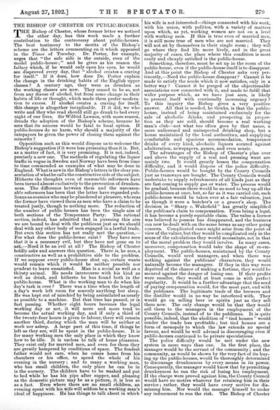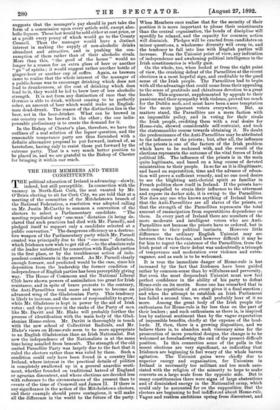THE BISHOP OF CHESTER ON PUBLIC-HOUSES. T HE Bishop of Chester,
whose former letter we noticed the other day, has this week made a further contribution to the controversy about public-houses. The best testimony to the merits of the Bishop's scheme are the letters commenting on it which appeared in the Times of Tuesday. Dr. Porter, for example, urges that "the safe side is the outside, even of the model public-house; " and he gives as his reason the fallacy which, if he would only open his eyes, he would see disproved every day, that "alcohol creates a craving for itself." if it does, how does Dr. Porter explain the change in the drinking habits of the English upper classes ? A century ago, they were as drunken as the working classes are now. They ceased to be so, not from any disuse of alcohol, but from some change in their habits of life or thought, which made them prefer modera- tion to excess. If alcohol creates a craving for itself, this change is altogether inexplicable. If it did, we who write and they who read should still go drunk to bed every night of our lives. Sir Wilfrid Lawson, with more reason, dreads the adoption of the Bishop's scheme, because he sees that its success would be fatal to local option. If public-houses do no harm, why should a majority of the ratepayers be given the power of closing them against the minority ?
Opposition such as this would dispose us to welcome the Bishop's suggestion if it were less promising than it is. But, as a matter of fact, it is very promising. It is not, indeed, precisely a new one. The methods of regulating the liquor traffic in vogue in Sweden and Norway have been from time to time commended as examples of what may be done in .England. What is new in the Bishop's letters is the clear pre- sentation of what he calls the constructive side of the subject. Hitherto the thoughts even of reasonable reformers have been turned almost exclusively to the prevention of drunken- ness. The difference between them and the unreason- able reformers has been that the latter have regarded pub- licans as enemies who may be plundered at pleasure, whereas the former have viewed them as men who have a claim to be treated justly, though to nothing more. The reduction of the number of public houses has been the single aim of both sections of the Temperance Party. The rational section, indeed, has admitted that in pursuing this aim we are bound to deal with the publicans just as we should deal with any other body of men engaged in a lawful trade. But even this section has not really met the question,— For what does the public-house exist ? They have seen that it is a necessary evil, but they have not gone on to ask,—Need it be an evil at all ? The Bishop of Chester boldly asks and answers this question. There is, he sees, a constructive as well as a prohibitive side to the problem. If we suppose every public-house shut up, certain wants would remain which it would be neither possible nor prudent to leave unsatisfied. Man is a social as well as a thirsty animal. He needs intercourse with his kind as well as drink, and hitherto he has found both in the public-house. What is the working man to do when his day's task is over ? There was a time when the length of a day's work left room for scarcely anything but sleep. He was kept out of mischief by being assimilated as nearly as possible to a machine. But that time has passed, or is fast passing. Whether eight hours becomes the legal working day or not, it will more and more tend to become the actual working day, and if only a third of the twenty-four hours is given to labour, there will remain another third, during which the man will be neither at work nor asleep. A large part of this time, if things be left as they are, will be spent in the public-house. It is for many working men the only place in which they know how to be idle. It is useless to talk of home pleasures. They exist only for married men, and even for them they are greatly hampered by conditions of space. The fondest father would not care, when he comes home from his chambers or his office, to spend the whole of his evening in the nursery ; and to many a working man, who has small children, the only place he can be in is the nursery. The children have to be washed and put to bed while he has his pipe after supper, and pleasing as the domestic picture may be as a picture, it is less so as a fact. Even where there are no small children, an evening spent with his wife will seldom be a working man's ideal of happiness. He has things to talk about in which his wife is not interested—things connected with his work, with his union, with politics, with a variety of matters upon which, as yet, working women are not on a level with working men. If this is true even of married men, it is still more true of men who are not married. They will not sit by themselves in their single room ; they will go where they find life more lively, and in the great majority of cases, the place where this condition is most easily and cheaply satisfied is the public-house.
Something, therefore, must be set up in the room of the public-house, even if the public-house itself is to disappear. And at this point the Bishop of Chester asks very per- tinently,—Need the public-house disappear ? Cannot it be made to satisfy the needs which it now satisfies, only in a better way ? Cannot it be purged of the objectionable associations now connected with it, and made to fulfil that wider purpose which, as we have just seen, is likely to present itself with continually increasing urgency ? To this inquiry the Bishop gives a very positive answer. All that is needed, he thinks, is that the public- house, instead of being maintained exclusively for the sale of alcoholic drinks, and prospering in propor- tion as they are sold, should become a real working man's club—not what too often goes by that name, a mere unlicensed and uninspected drinking shop, but a house maintained by the local authorities, and supplying comfortable and spacious accommodation, temperance drinks of every kind, alcoholic liquors secured against adulteration, newspapers, games, and even music.
The advantages of the Bishop of Chester's plan over and above the supply of a real and pressing want are mainly two. It would greatly lessen the compensation difficulty, and it would dispose of the police difficulty. Public-houses would be bought by the County Councils just as tramways are bought. The County Councils would undertake to supply refreshments of all kinds just as they are fast coming to supply gas or water. The process would. be gradual, because there would be no need to buy up all the public-houses at once, but, so far as it was carried out, each public-house would be taken over at a fair valuation, just as though it were a butcher's or a grocer's shop. The decision in "Sharp v. Wakefield" has greatly simplified the publican's claim to compensation. From being a legal, it has become a purely equitable claim. The value a licence was believed to possess has disappeared, and the business can now be dealt with on the same terms as any other going concern. Complicated cases might arise from the point of view of the valuer, but they would be complicated only in the sense of the calculations they would necessitate, not in that of the moral problem they would involve. In many cases, moreover, compensation would take the shape of re-em- ployment. The public-houses, maintained by the County Councils, would need managers, and when there was nothing against the publicans' characters, they would naturally become the managers. If they in this way were deprived of the chance of making a fortune, they would be secured against the danger of losing one. If their profits were smaller, they would at least come in with perfect regularity. It would be a further advantage that the need of paying compensation would, for the most part, end with the publicans. The legitimate trade of the brewers and the distiller would in no way be interfered with. They would go on selling beer or spirits just as they sell them now. The only change would be that they would sell them to the managers in the employment of the County Councils, instead of to the publicans. It is quite possible, indeed, that the abolition of "tied houses " would render the trade less profitable ; but tied houses are a form of monopoly to which the law extends no special favour, and would be well advised in discouraging even if public-houses continued to be private speculations.
The police difficulty would be met under the new system in more ways than one. In the first place, the manager would be the servant of the community ; and the community, as would be shown by the very fact of its buy- ing up the public-houses, would be thoroughly determined to discourage drunkenness by every means in its power. Consequently, the manager would know that by permitting drunkenness he ran the risk of losing his employment. If the charge were proved against him, the County Council would have no motive whatever for retaining him in their service ; rather, they would have every motive for dis- missing him. Nor would the manager himself be under any inducement to run the risk. The Bishop of Cbester suggests that the manager's pay should in part take the form of a commission upon every article sold, except alco- holic liquors. These last would be sold either at cost price, or at a profit every penny of which would go to the County Council. Thus the manager would have a distinct interest in making the supply of non-alcoholic drinks abundant and attractive, and in pushing the con- sumption of them rather than of their alcoholic rivals. More than this, "the good of the house" would no longer be a reason for an extra glass of beer or another "go " of spirits ; it would suggest rather another bottle of ginger-beer or another cup of coffee. Again, as brewers came to realise that the whole interest of the manager of a public-house was to encourage drinking which does not lead to drunkenness, at the cost of drinking which does lead to it, they would be led to brew beer of less alcoholic strength. It is not from any distinction of race that the German is able to drink, without ceasing to be perfectly sober, an amount of beer which would make an English- man dead-drunk. The reason of the distinction lies in the beer, not in the beer-drinker. What can be brewed in one country can be brewed in the other ; the one indis- pensable preliminary is to create the demand for it. In the Bishop of Chester's plan, therefore, we have the outlines of a real solution of the liquor question, and the reasonable temperance party are thus furnished with a definite alternative proposal to put forward, instead of, as heretofore, having only to resist those put forward by the extreme party. That is a very much better position to be placed in, and we are grateful to the Bishop of Chester for bringing it within our reach.



































 Previous page
Previous page